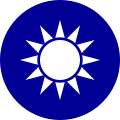Wu Tsung-tsong
Wu Tsung-tsong | |||||||||||||||||||||||||||||
|---|---|---|---|---|---|---|---|---|---|---|---|---|---|---|---|---|---|---|---|---|---|---|---|---|---|---|---|---|---|
| 吳政忠 | |||||||||||||||||||||||||||||
 | |||||||||||||||||||||||||||||
| 1st Minister of Science and Technology Council | |||||||||||||||||||||||||||||
| In office 27 July 2022 – 20 May 2024 | |||||||||||||||||||||||||||||
| Premier | Su Tseng-chang Chen Chien-jen | ||||||||||||||||||||||||||||
| Deputy | Chen Tzong-chyuan Lin Minn-tsong | ||||||||||||||||||||||||||||
| Preceded by | Himself (as the Minister of Science and Technology) | ||||||||||||||||||||||||||||
| Succeeded by | Wu Cheng-wen | ||||||||||||||||||||||||||||
| |||||||||||||||||||||||||||||
| Personal details | |||||||||||||||||||||||||||||
| Born | March 7, 1955 | ||||||||||||||||||||||||||||
| Political party | Independent | ||||||||||||||||||||||||||||
| Education | National Taiwan University (BS) Cornell University (MS, PhD) | ||||||||||||||||||||||||||||
Wu Tsung-tsong (Chinese: 吳政忠; pinyin: Wú Zhèngzhōng; born March 7, 1955) is a Taiwanese mechanical engineer and academic who served as Minister without Portfolio and the Minister of Science and Technology Council of Taiwan.
Early life and education
[edit]Wu was born in Taiwan on March 7, 1955. After graduating from National Tainan First Senior High School, he attended National Taiwan University (NTU) and graduated from NTU with a Bachelor of Science (B.S.) in 1977 in civil engineering. He completed two years of military service in the Republic of China Armed Forces and then became a teaching assistant in the NTU Department of Civil Engineering.[1]
In June 1981, Wu went to the United States to complete graduate studies in the wave theory of light and acoustic emission at Cornell University in Ithaca, New York.[1] He earned his Master of Science (M.S.) and his Ph.D. in analytical mechanics and applied mechanics from Cornell in 1983 and 1987, respectively.[2][3] His doctoral dissertation was titled, "Theory of Acoustoplasticity and Ultrasonic Measurements of Residual Stress,"[4] and was supervised by professors Wolfgang Sachse and Yih-Hsing Pao.[1]
Academic career
[edit]After receiving his doctorate, Wu became a professor at the Institute of Applied Mechanics of National Taiwan University.[5][6]
Political career
[edit]Wu served as deputy minister of the National Science Council under Chen Chien-jen.[7] He returned to public service as minister without portfolio specializing in technology-related policy upon the presidential inauguration of Tsai Ing-wen in 2016.[8] From this position, Wu commented on several aspects of digital infrastructure,[9] including the implementation of 5G telecommunications[10][11] and the proliferation of fake news online.[12] He served concurrently on the governmental Board of Science and Technology as a deputy convenor.[13] Wu was retained in his post when William Lai assumed the premiership in September 2017.[14] He remained as Su Tseng-chang replaced Lai in January 2019.[15][16] Wu succeeded Chen Liang-gee as minister of science and technology at the start of Tsai Ing-wen's second presidential term.[17][18]
References
[edit]- ^ a b c "THEORY OF ACOUSTOPLASTICITY AND ULTRASONIC MEASUREMENTS OF RESIDUAL STRESSES - ProQuest". www.proquest.com. Retrieved 2025-03-23.
- ^ "Tsung Tsong Wu - 國立臺灣大學應用力學研究所". www.iam.ntu.edu.tw. Retrieved 2025-03-23.
- ^ "Tsung Tsong Wu". National Taiwan University. Retrieved 19 May 2020.
- ^ Wu, Tsung-Tsong; Pao, Yih-Hsing (1988), Thompson, Donald O.; Chimenti, Dale E. (eds.), "Acoustoelastic Responses of an Elastoplastically Deformed Body", Review of Progress in Quantitative Nondestructive Evaluation: Volume 7B, Boston, MA: Springer US, pp. 1343–1348, doi:10.1007/978-1-4613-0979-6_55, ISBN 978-1-4613-0979-6, retrieved 2025-03-23
- ^ Chao, Vincent Y. (23 April 2010). "DPP forum discusses environment". Taipei Times. Retrieved 19 May 2020.
- ^ Pan, Han-shen (27 June 2012). "Cracks in nuclear policy beg questions". Taipei Times. Retrieved 19 May 2020.
- ^ Shih, Hsiu-chuan (10 April 2008). "Reports point to economic achievements under DPP". Taipei Times. Retrieved 19 May 2020.
- ^ Lin, Chia-nan (21 May 2020). "New chief heads science ministry". Taipei Times. Retrieved 20 May 2020.
- ^ Chen, Wei-han (25 November 2016). "Executive Yuan approves digital infrastructure plan". Taipei Times. Retrieved 19 May 2020.
- ^ Hetherington, William (22 March 2017). "Cabinet unveils US$1.5bn digital infrastructure plan". Taipei Times. Retrieved 19 May 2020.
- ^ Shan, Shelley (5 December 2019). "NCC sets NT$30bn 5G spectrum auction floor price". Taipei Times. Retrieved 19 May 2020.
- ^ Lee, Hsin-fang; Chung, Jake (23 July 2017). "Rumor-quashing Web site planned". Taipei Times. Retrieved 19 May 2020.
- ^ Lin, Chia-nan (4 December 2018). "KMT lawmakers demand answers from minister". Taipei Times. Retrieved 19 May 2020.
- ^ Chen, Wei-han (8 September 2017). "Lai to replace two Cabinet ministers, retain all others". Taipei Times. Retrieved 19 May 2020.
- ^ Yeh, Su-ping; Ku, Chuan; Hsu, Elizabeth; Huang, Frances; Yen, William (13 January 2019). "Kolas Yotaka to stay on as Cabinet spokeswoman". Central News Agency. Retrieved 19 May 2020.
- ^ Ku, Chuan; Yen, William; Hsu, Elizabeth; Huang, Frances (12 January 2020). "Acting COA minister to be officially named to head agency: sources". Central News Agency. Retrieved 19 May 2020.
- ^ "Cabinet to contain familiar faces, sources say". Taipei Times. 16 May 2020. Retrieved 19 May 2020.
- ^ Ku, Chuan; Yu, Matt; Yeh, Joseph (19 May 2020). "Minor Cabinet reshuffle announced ahead of Tsai's new term". Central News Agency. Retrieved 19 May 2020.

